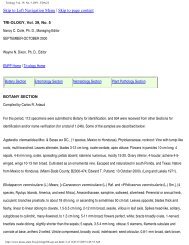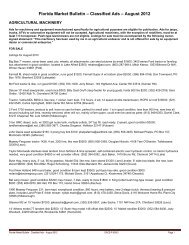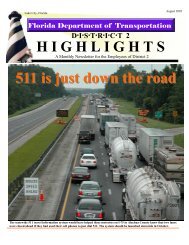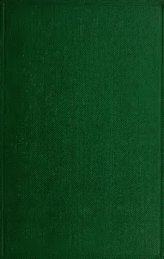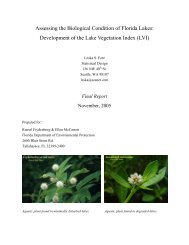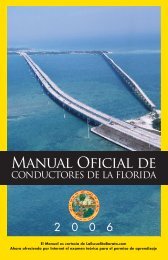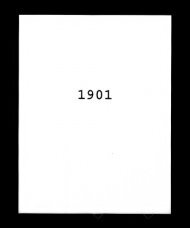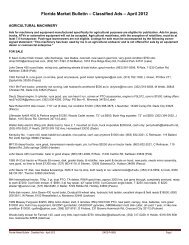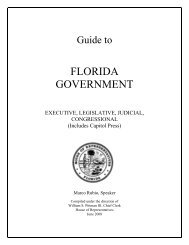Version A final setup - Florida House of Representatives
Version A final setup - Florida House of Representatives
Version A final setup - Florida House of Representatives
You also want an ePaper? Increase the reach of your titles
YUMPU automatically turns print PDFs into web optimized ePapers that Google loves.
(4) Work papers held by the Office <strong>of</strong> Program Policy Analysis and<br />
Government Accountability which relate to an authorized project or a research<br />
product are exempt from s. 24(a), Art. I <strong>of</strong> the State Constitution. The exemption<br />
applies to work papers held by the Office <strong>of</strong> Program Policy Analysis and<br />
Government Accountability before, on, or after the effective date <strong>of</strong> the<br />
exemption.<br />
11.62 Legislative review <strong>of</strong> proposed regulation <strong>of</strong> unregulated functions.—<br />
(1) This section may be cited as the "Sunrise Act."<br />
(2) It is the intent <strong>of</strong> the Legislature:<br />
(a) That no pr<strong>of</strong>ession or occupation be subject to regulation by the<br />
state unless the regulation is necessary to protect the public health, safety, or<br />
welfare from significant and discernible harm or damage and that the police<br />
power <strong>of</strong> the state be exercised only to the extent necessary for that purpose; and<br />
(b) That no pr<strong>of</strong>ession or occupation be regulated by the state in a<br />
manner that unnecessarily restricts entry into the practice <strong>of</strong> the pr<strong>of</strong>ession or<br />
occupation or adversely affects the availability <strong>of</strong> the pr<strong>of</strong>essional or<br />
occupational services to the public.<br />
(3) In determining whether to regulate a pr<strong>of</strong>ession or occupation, the<br />
Legislature shall consider the following factors:<br />
(a) Whether the unregulated practice <strong>of</strong> the pr<strong>of</strong>ession or occupation<br />
will substantially harm or endanger the public health, safety, or welfare, and<br />
whether the potential for harm is recognizable and not remote;<br />
(b) Whether the practice <strong>of</strong> the pr<strong>of</strong>ession or occupation requires<br />
specialized skill or training, and whether that skill or training is readily<br />
measurable or quantifiable so that examination or training requirements would<br />
reasonably assure initial and continuing pr<strong>of</strong>essional or occupational ability;<br />
(c) Whether the regulation will have an unreasonable effect on job<br />
creation or job retention in the state or will place unreasonable restrictions on<br />
the ability <strong>of</strong> individuals who seek to practice or who are practicing a given<br />
pr<strong>of</strong>ession or occupation to find employment;<br />
(d) Whether the public is or can be effectively protected by other<br />
means; and<br />
(e) Whether the overall cost-effectiveness and economic impact <strong>of</strong> the<br />
proposed regulation, including the indirect costs to consumers, will be favorable.<br />
(4) The proponents <strong>of</strong> legislation that provides for the regulation <strong>of</strong> a<br />
pr<strong>of</strong>ession or occupation not already expressly subject to state regulation shall<br />
provide, upon request, the following information in writing to the state agency<br />
that is proposed to have jurisdiction over the regulation and to the legislative<br />
committees to which the legislation is referred:<br />
(a) The number <strong>of</strong> individuals or businesses that would be subject to<br />
the regulation;<br />
A-15



